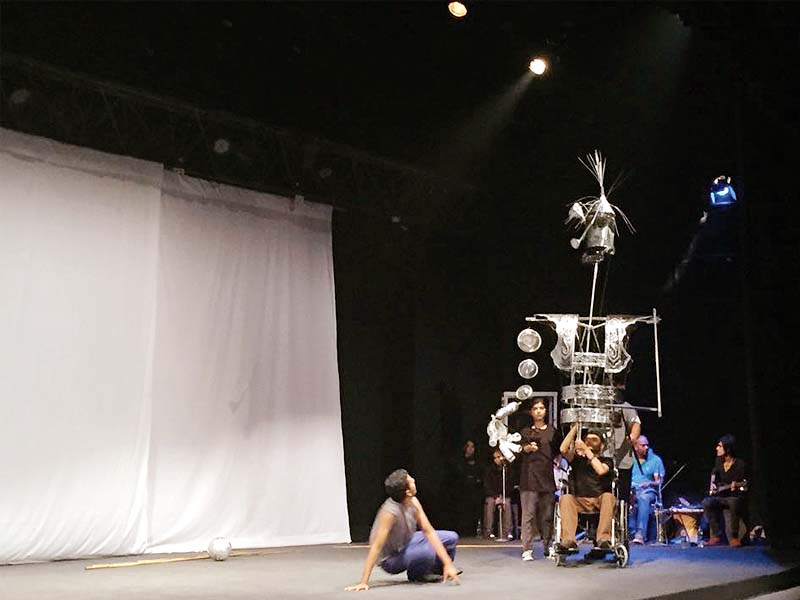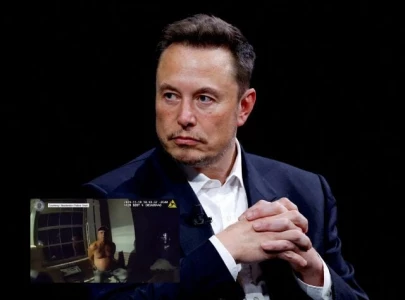
I first heard Ae Jazba-e-Dil Gar Main Chahoon somewhere in the mid 90s in a PTV long-play on Major Raja Aziz Bhatti Shaheed. The Nishan-e-Haider recipient plays the ghazal on his harmonica to lift the spirits of his brothers in arms around a bonfire in the middle of wilderness. It was a sweet, easy-on the-ears and catchy tune. But the listening experience sees a transition in the climax. Sweetness turns to sorrow as Bhatti gets martyred on the battlefront, refusing to give in to the advancing enemy. Behzad Lakhnavi’s timeless words resonate once again – Ae Jazba-e-Dil Gar Main Chahoon, Har Cheez Muqabil Ajaye.
On Friday night, almost two decades later, the poem was resurrected in my memory once again. It was the National Academy of Performing Arts (Napa), not a battlefront, and the lyrics encircled the lives of fighters of another kind altogether. Perhaps it was the conviction of physically-impaired children that overshadowed everything else.
Students of Ida Rieu School, College for Deaf and Blind, JS Academy for the Deaf and Deaf Reach School came together to show the bastion of theatre in the city what expressionism is all about. Inspired by Ted Hughes’ The Iron Man, the play that was titled Iron Man in Karachi was put together by Daryl Beeton of the Graeae Theatre Company (UK).
No strings attached
The play opens in a busy street of Karachi where everyone is trying to outpace life in the ever-expanding metropolis. Carpenters, plumbers and blacksmiths are all lending each other a shoulder. Nothing is still in the entire scenario, except for poor Hogath with whom nobody wants to work. They poke fun at him and in the midst of all this, arrives Iron Man.
The metallic monster embarks on a rampage, destroying everything in the city. People try to stop him, even request him to leave, but to no avail. Finally Hogath dodges the oncoming monster that falls into a ditch and dies. There is a second coming of Iron Man too, but this time he befriends the residents of the city and helps them defend it from a foreign enemy.
Despite the minimalistic storyline, the passion of these children outshone everything. Be it the meticulous coordination of all the actors or Ilma Abdul Raoof’s serenading voice, the children spun magic into the play. Despite being visually-impaired, Raoof helped us picture a whole new world through her voice.
Mowgli takes children on jungle safari
Iron Man in Karachi was part of the ‘Artabled’ programme by the British Council that aims to promote inclusiveness in the arts and develop opportunities and professional training for impaired people, artists and educators.
The performance was followed by a panel discussion in which British Council Head of Arts Sumbul Khan, Napa Repertory Theater Company Artistic Director Zain Ahmed and Graeae’s Creative Learning Director Jodie Alissa Bickerton spoke about the importance of inclusivity in performing arts. Graeae is a theatre company led by the disabled themselves. It leads the way in pioneering, trail-blazing theatre in the UK and internationally.
“The main challenge of putting together Iron Man in Karachi was to work with three different languages; English, Urdu and the Pakistani sign language,” said Jodie. She hoped the way locals befriend Iron Man and begin to consider him one of them in the play, the same treatment can be applied to those who are differently-abled. A lady representing a school that deals with cerebral palsy patients asked her if Graeae will be willing to feature their students in such plays, the answer to which was a resounding yes.
Published in The Express Tribune, November 17th, 2015.
Like Life & Style on Facebook, follow @ETLifeandStyle on Twitter for the latest in fashion, gossip and entertainment.





1732532396-0/Express-Tribune-(12)1732532396-0-270x192.webp)











COMMENTS
Comments are moderated and generally will be posted if they are on-topic and not abusive.
For more information, please see our Comments FAQ